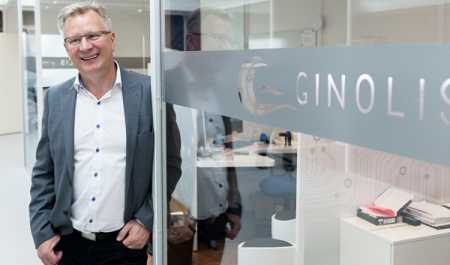Wed, 16 Sep, 2015 03:02:07 AM FTimes Report, Sep 16
“There are companies in the medical tech field that can offer you diagnostics devices and tools, and there are other companies that take care of the manufacturing and automatisation. But we can do both. And that’s something I’ve yet to see done anywhere else,” said Ginolis CEO Teijo Fabritius. “We started as a manufacturing company for medical automation devices in 2010, and that’s still where the major part of our income comes from,” said Fabritius. But, since 2014, when Ginolis bought a Swedish diagnostics company, many things have changed. The current form of Ginolis combines both of those assets. “As far as I know, no one else can currently offer what we do.” A good example of Ginolis’s competence is a small chip-like device that electronically tests the patient for melanoma. Filled with microscopic needles, it weighs only grams and is the size of a finger nail. Once inserted, it measures the electricity within the tissue, which is then compared to the tissue in the dubious mole in the patient. The device is being sold in Australia, and its validation is pending in the United States. In Europe, the validation has been granted and sales are already starting. The device called Nevisense is marketed by a Swedish company called Scibase, and Ginolis has big expectations. Although the company still relies much on its automatisation business, Fabritius is confident about the market growth in the disposable diagnostics field. He thinks self-diagnostics will soon be as common as insulin shots for diabetes – imagine the savings, if you did not have to go to your healthcare centre for a blood, tissue, or urine sample! Ginolis is developing a transparent plastic disc etched with micro-structured shapes that can have several diagnostics sticks filled with electronic trails for patented substances. Once the sample is diagnosed, the output is fed automatically to the computer system. “We’re currently thinking about reducing the gap between taking a sample and analysing it,” explained Fabritius. It means intelligent micro needles – no more dropping blood on a glass plate. The outskirts of Oulu have been a good ground for electronics production for decades, with Elektrobit, Polar and others, some of which were built upon subcontracting electronics manufacture for Nokia mobile phones, others on products of their own. But since Nokia decided to leave the cellular phone market as a brand, a shift in perspective is taking place. Ginolis is one of the leading companies utilising the talent base and the networks in the region. Although the ICT background of the region has served them well, Fabritius wouldn’t mind seeing engineering education combined with healthcare and life science. “We’re in need of testing environments and user experiences, and those are hard to come by.” Taking a device into everyday use before it’s completely finished for test purposes can hinder medical work. So the company is currently collaborating with the healthcare department of the University of Applied Sciences. With offices also in San Diego and Uppsala, where the company is building a production line for the melanoma analysing chip, and plans to recruit 20 more people by the end of the year, making a total headcount of 80, business definitely seems to be on the right track. “We’re going to keep our headquarters and also the main production platform in Oulu. Currently, we can’t see any incentive in moving the Oulu-based production elsewhere,” declared Fabritius.
More News
|
|
Finland Times
| Thursday, 18 December, 2025 |


